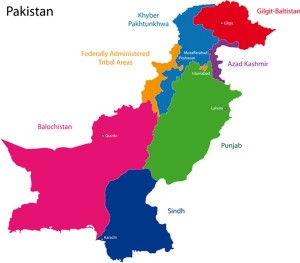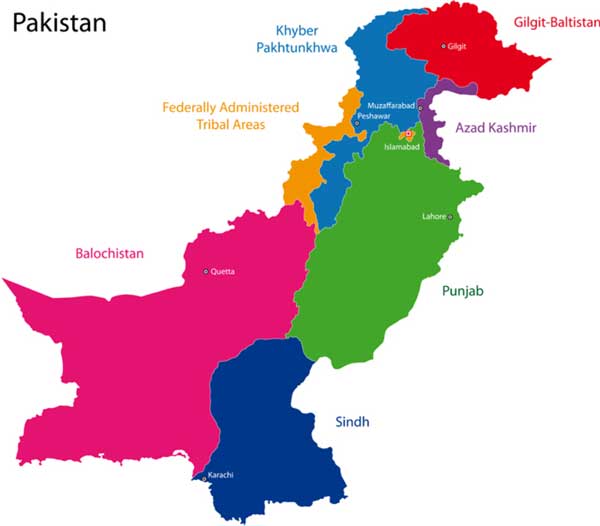
12/22/2011 – In addition to the immediate causes of the November 26 incident, there are deeper reasons for the elevated levels of tension that have degraded Pakistani-U.S. relations during the past few years.
The two countries have regularly been allies at cross-purposes.
After achieving independence, Pakistan’s initial inclination was to focus its strategic orientation toward the United States. During the 1950s, Pakistan joined several U.S.-led anti-Soviet groups and received most of its weapons from the United States. But the strategic focus of Washington and Islamabad fundamentally differed. Whereas U.S. policy makers saw Pakistan as a military partner against the Soviet Union, and sought not to alienate India, Pakistani leaders were searching for a great power patron to help defend them against their more powerful Indian neighbor. For the past half-century, Pakistanis have been repeatedly disappointed by Washington’s failure to come to their aid against India.
The Soviet invasion of Afghanistan in late 1979 reinvigorated Pakistan-U.S. security ties. They fought together during the 1980s against the Soviet occupation forces, but the withdraw of the Soviet army from Afghanistan and the subsequent disappearance of the Soviet threat in the 1990s led to a parting if ways. The United States effectively walked away from Afghanistan, leaving Pakistan to manage the resulting chaos and civil war.

A few years later, the United States froze arms sales and other defense cooperation with Islamabad over Pakistanis’ nuclear weapons activities, In 1990, the U.S. Congress enacted the so-called Pressler amendment, which required the executive branch to certify that Pakistan was not pursuing nuclear weapons to remain eligible to receive U.S. weapons and other military assistance. Since the William Clinton administration could not genuinely certify that condition, the United States froze $1.2 billion worth of military deliveries, including some F-16 warplanes that Pakistan had already paid for.
After Pakistan carried out nuclear tests in 1998 and General Pervez Musharraf overthrew Pakistan’s civilian government led by Nawaz Sharif, the United States imposed additional economic and military sanctions on Pakistan. Relations did not improve until the events of 9/11 forced Pakistan to choose being for or against Washington. Islamabad prudently declared itself in support for the U.S.-led war on terror, though certain elements of Pakistan’s security establishment hedged their bets and maintained their terrorist ties.
Pakistanis complain that Americans too often describe Pakistan as a problem rather than a partner, but the United States has reasonable grounds for concern. Some of the most serious international terrorist plots in recent years have been traced back to Pakistan. Following terrorist training in a camp run by al-Qaeda in Pakistan, Najibullah Zazi, a legal permanent resident of the United States, tried in September 2009 to detonate an improvised explosive device in the New York City subway system during rush hour. The Pakistani Taliban has colluded with al-Qaeda to attempt terrorist attacks against targets in Western Europe and North America, including by using a Pakistani-American, Faisal Shahzad, in an unsuccessful attempt to detonate a car bomb at New York City’s Times Square in May 2010.
Changes in the coalition’s military policy during the past few years also contributed to the worsening situation.
The recent intensified fighting in Afghanistan has led U.S. officials to adopt a less tolerant attitude toward the Pakistan-based Islamists who conduct cross-border attacks. The White House and the Pentagon have, like their Afghan colleagues, become increasingly frustrated by the presence of the insurgent sanctuaries on Pakistani territory and the failure of the Pakistani government to establish control there. Taliban and Haqqani guerrillas are sallying forth from their sanctuaries in Pakistan and attacking Afghan army outposts in eastern Afghanistan, then fleeing back across the border with NATO aircrews in hot pursuit. The Obama administration has authorized a more “proactive” air campaign against the Pakistani-based militants. While still declining to send U.S. ground forces across the border into Pakistan, the Pentagon increased the use of both manned helicopter attacks along the border and unmanned aerial vehicle strikes for hitting targets deeper inside Pakistani territory.
Meanwhile, the Pakistani government, at U.S. urging, has increased the number of soldiers at border posts in its intensified campaign against Islamist militants located in border areas. Some of these militants have relocated across the frontier and now attack Pakistani forces from safe havens in Afghanistan’s Kunar and Nuristan provinces in eastern Afghanistan. Pakistani forces have responded by firing artillery and other weapons against these targets, located in Afghanistan.
Both the incumbent administrations in Pakistan and the United States have incentives to act tough to boost their support in upcoming national elections. President Obama has found it difficult to apologize for the incident knowing that his Republican critics will attack him for doing so. Members of Congress have already called for imposing more stringent conditions on Pakistan over the bin Laden and Haqqani affairs.
Pakistan’s transformation into a political democracy since 2007, though welcome for other reasons, has complicated the management of alliance ties with the United States. President Asif Ali Zardari and Prime Minister Yousaf Raza Gilani want to remain in power after the 2013 national elections in Pakistan. These plans are challenged by the pervasive anti-American sentiment in Pakistan. Imran Khan, a cricket star turned politician, has exploited this sentiment. Once seen as a fringe candidate, Khan has attracted increasing attention by calling on Pakistan to renounce U.S. aid and end its alliance with the United States. Zardari and other Pakistani politicians have responded by adopting an elevated anti-American tone in public.
Pakistan’s civilian government is in a difficult situation.
On the one hand, its members must show Pakistani nationalists that they are not American lackeys and will resist Washington’s pressure. The advent of a democracy has made it more difficult for the government to ignore popular views in the way the previous military governments have done.
Pakistani public opinion is clearly hostile to the United States in general and U.S. military operations within their country in particular. Pakistanis widely blame the U.S. war against the Taliban and al-Qaeda for bringing terrorism to Pakistan, which has suffered from suicide bombings and other civil strife in recent years. They see the stepped up drone and border attacks of recent years as a form of coercive pressure to get them to crack down on the Taliban insurgents and terrorists operating in its tribal areas.
Many Pakistanis erroneously believe that the United States favors India over Pakistan and is seeking to work with New Delhi and Israel to constrain Pakistan’s regional influence and hobble Pakistan’s nuclear arsenal. They also mistakenly argue that the rise of suicide terrorism within Pakistan is due to Islamabad’s support for U.S. counterterrorism policies, such as sending in the army to fight Islamists in the FATA, and not to their own sponsorship and mistaken belief that they can separate “good” from “bad” terrorists.
In this regard, both Americans and Pakistanis have a perception that the other is ungrateful. Americans resent the fact that Pakistanis hate them despite the billions in aid they have provided. The U.S. Congress has appropriated more than $22 billion in economic and security-related aid to Pakistan since 2002. The Obama administration has launched a five-year, $7.5-billion economic aid program to construct schools, improve electricity, and promote Pakistan’s socioeconomic development.
Pakistanis note that U.S. aid covers only a small percentage of those costs, and that even now the U.S. Congress is cutting back on earlier aid pledges, many of which remain unimplemented. Indeed, the U.S. Government Accountability Office found earlier this year that most U.S. aid goes to contractors, is diverted by corrupt Pakistani officials, or is simply never spent.
Pakistanis further complain that the little aid that does arrive is shaped by U.S. priorities and perspectives rather than Pakistani needs. They want a greater say in how the funded projects are designed, implemented, and evaluated. For example, they claim that the Kerry-Lugar-Berman Act providing $1.5 billion in annual economic assistance for five years is so tied and conditional that it violates Pakistani sovereignty.
Pakistanis gripe that Americans fail to appreciate all the sacrifices they have incurred in fighting terrorism. Pakistanis blame their financial losses and other costs on Islamabad’s decisions to join Washington’s war on terror after 9/11, though the number of suicide attacks and Pakistani government and civilian casualties has surged only after the July 2007 military operation against the Red Mosque in Islamabad, following the kidnapping of several Chinese citizens. Some Pakistanis see the current criticism as simply an Afghan-U.S. effort to “scapegoat” Pakistan for their inability to reverse what looks to be a losing war.
Misperceptions regarding each other’s capabilities and intentions are also an enduring problem in the U.S.-Pakistani relationship.
U.S. officials and their NATO and Afghan allies believe that the Pakistani military could suppress the Afghan Taliban insurgents in the border areas if they made a sincere effort to do so.
Meanwhile, Pakistani officials think that if the coalition really got its act together, it could easily employ its overwhelming capabilities to crush the Taliban guerrillas and secure the Afghan-Pakistan border. The failure to do so gives rise to all sorts of suspicions that the United States is secretly sustaining the insurgency in order to justify its continued military presence in the region. Pakistanis also believe that ineffective Afghan and NATO policies have contributed to the rise of the Afghan Taliban.
Pakistani military politics have further complicated matters.
Pakistani officers as well as Pakistani politicians have severely criticized the military for failing to prevent the U,S. Special Forces raid against bin Laden’s compound in central Pakistan. Middle-ranking officers have attacked Pakistani Army Chief Gen. Ashfaq Parvez Kayani for collaborating with the United States in a war that has caused thousands of Pakistani military casualties. According to retired Lt. Gen. Talat Masood, “This is very serious for Kayani. The troops are so angry. They are supposed to be allies with the Americans, and the allies are killing them. He has to be sensitive to their feelings. He has to be careful about his own image and his own safety.” The Pakistani military leadership felt it had to respond strongly to the November 26 cross-border incident, which has also generated popular sympathy and more popular support for the military.
Nobody has an interest in the Pakistani military’s retaking political power, but few analysts believe the military wants to do so. On the one hand, the officers would not want to assume direct responsibility for the crises now besetting Pakistan. On the other hand, the current civilian government has effectively given the military whatever it wants, including vast resources and considerable autonomy to act as it sees fit, including in some ways unwelcome to Washington and its allies.
Recently, the military was able to force the ouster of Husain Haqqani, Pakistan’s ambassador to the United States, who was accused of supporting of civilian coup against the military’s domination of his country. This alleged conspiracy supposedly would have had Pakistan’s weak civilian government collude with Washington to replace Pakistan’s current military and intelligence leaders with those more supportive of civilian supremacy and willing to break with the Islamist forces in Pakistan and Afghanistan. Haqqani denied that he was involved in such a conspiracy but, having already antagonized the powerful Pakistani military, had to resign. Haqqani’s 2005 book blamed military intervention in Pakistan’s political affairs for encouraging the growth of Islamist militancy in Pakistan and elsewhere.
The Pakistani government has endorsed efforts at reintegration and reconciliation in Afghanistan, but Pakistani authorities want to determine which insurgents will enter the negotiations and what terms they will accept. Pakistani officials will hedge against the possibility that the Taliban will regain control of some, if not all, of Afghanistan, by maintaining operational ties with the group, despite Afghan and U.S. complaints.
Pakistan’s “hedging strategy” aims to ensure that Islamabad retains significant influence in Afghanistan no matter who rules Kabul, especially among the large ethnic Pashtun tribes who live on both sides of the 2,430-kilometer (1,510 mile) Afghan-Pakistan frontier.
Their presence facilitates the infiltration of Taliban insurgents, many of whom are ethnic Pashtuns. An estimated 40-50 million Pashtuns (some 29 million in Pakistan and 12.5 million in Afghanistan) live on either side of the Durand Line, which formally divided the territory of Afghanistan and Pakistan (then part of the British Raj) in 1893. The Pakistani government considers the line a formal international border, but the government of Afghanistan does not.
The Pakistani military is hoping for an orderly, timely withdrawal of American troops from Afghanistan in the context of negotiations with the Taliban. Given its longtime relationship with the Taliban leadership, Pakistan’s military establishment aims to position itself as the mediator in any such negotiations and push for a new coalition government in Kabul with greater Pashtun representation and diminished Indian influence. Pakistan’s security establishment has never truly embraced Karzai’s government, which it sees as dominated by the ethnic Tajik, Uzbek and Hazara forces of the India-backed Northern Alliance.
Whereas Americans see the success of the U.S. counterinsurgency operation in Afghanistan as central to Pakistan’s security, Pakistani generals see a U.S. departure as key to finally stabilizing their country.
Also see Richard Weitz’s comments at http://rt.com/news/tipping-point-us-pakistan-947/.


